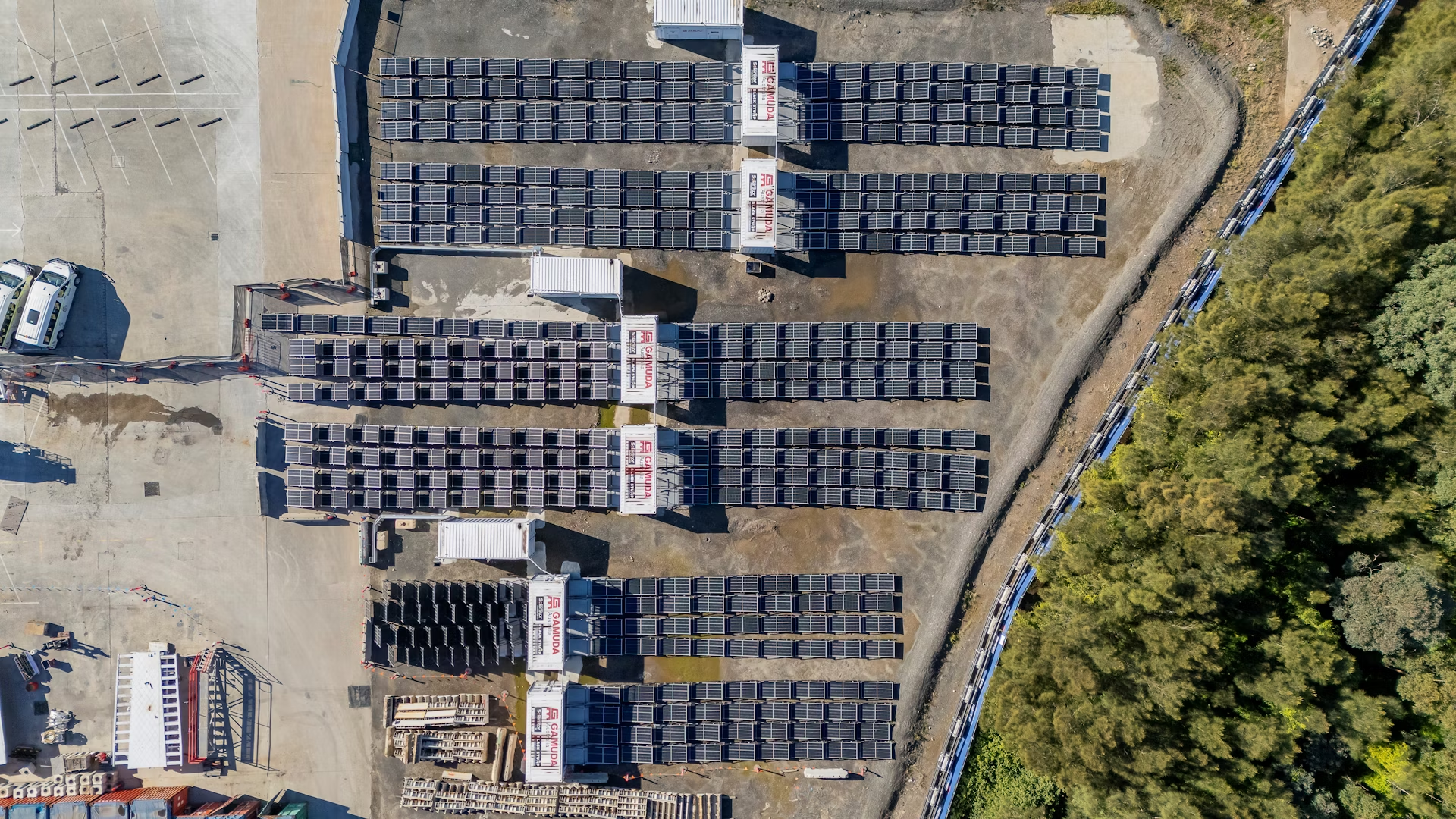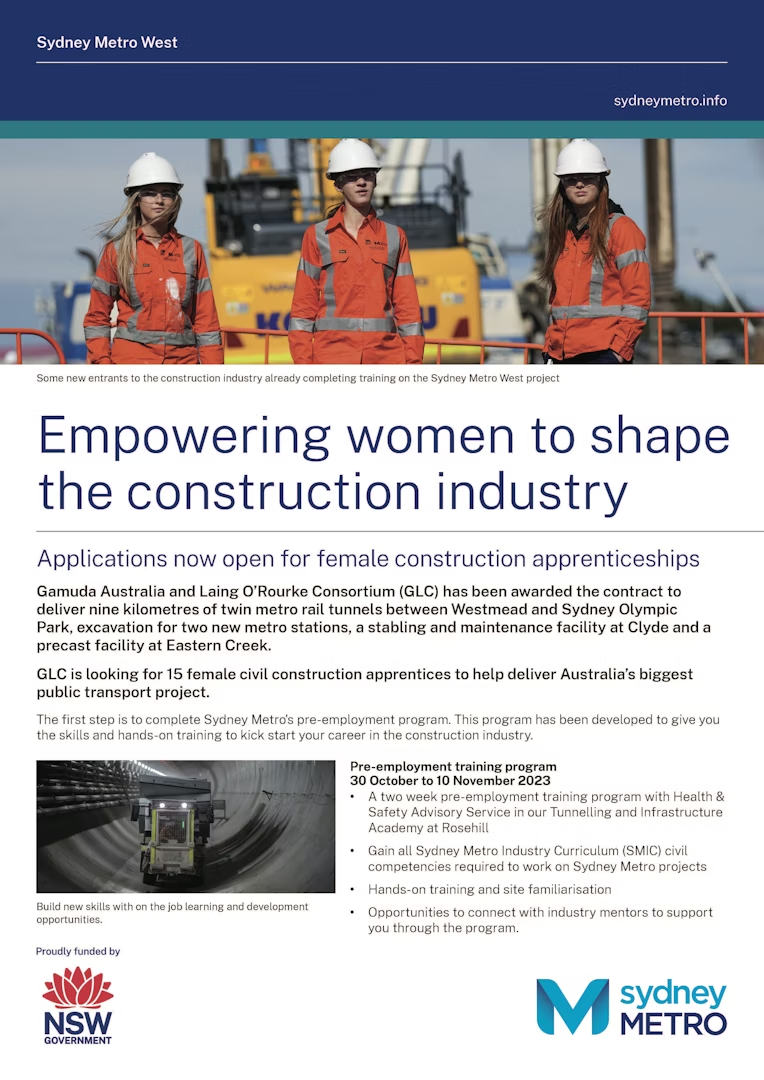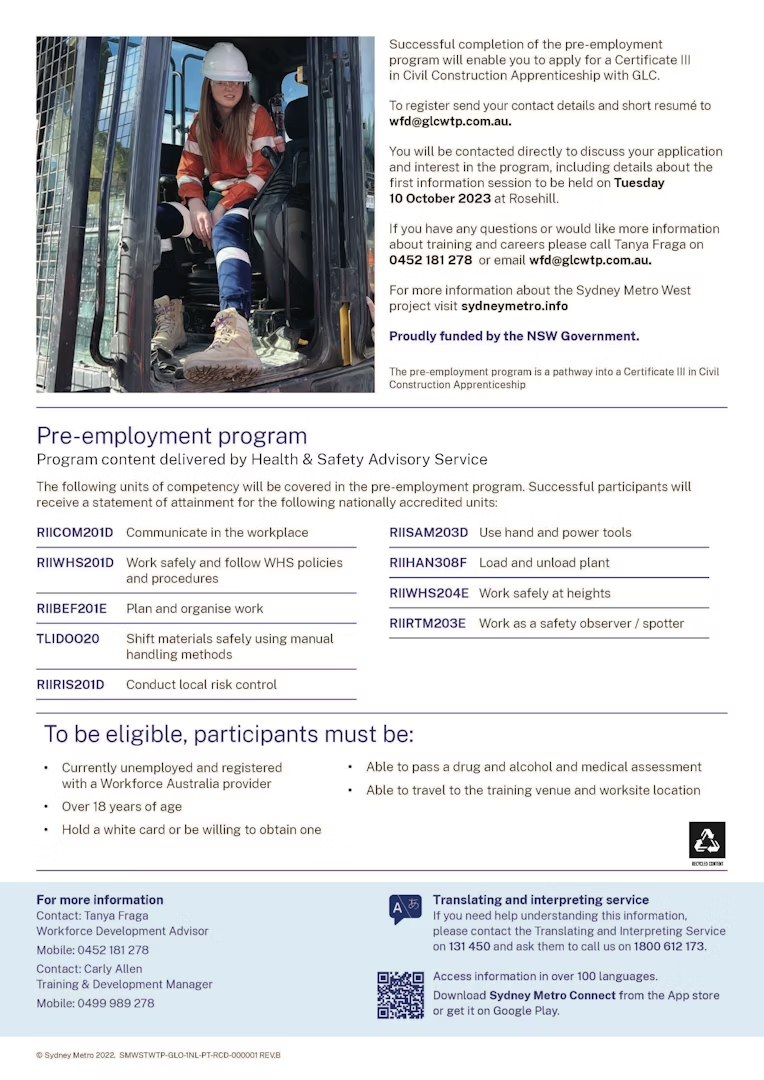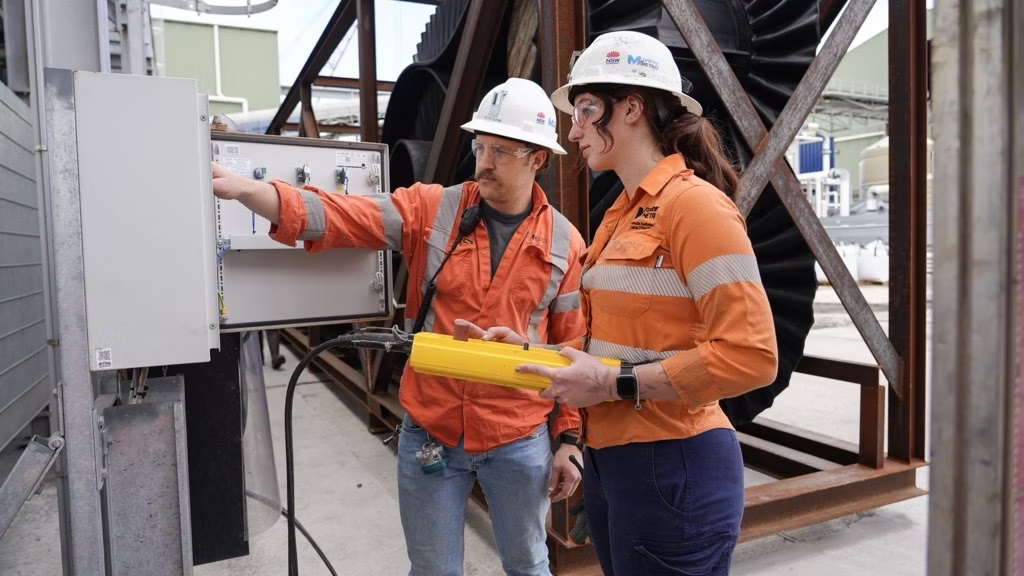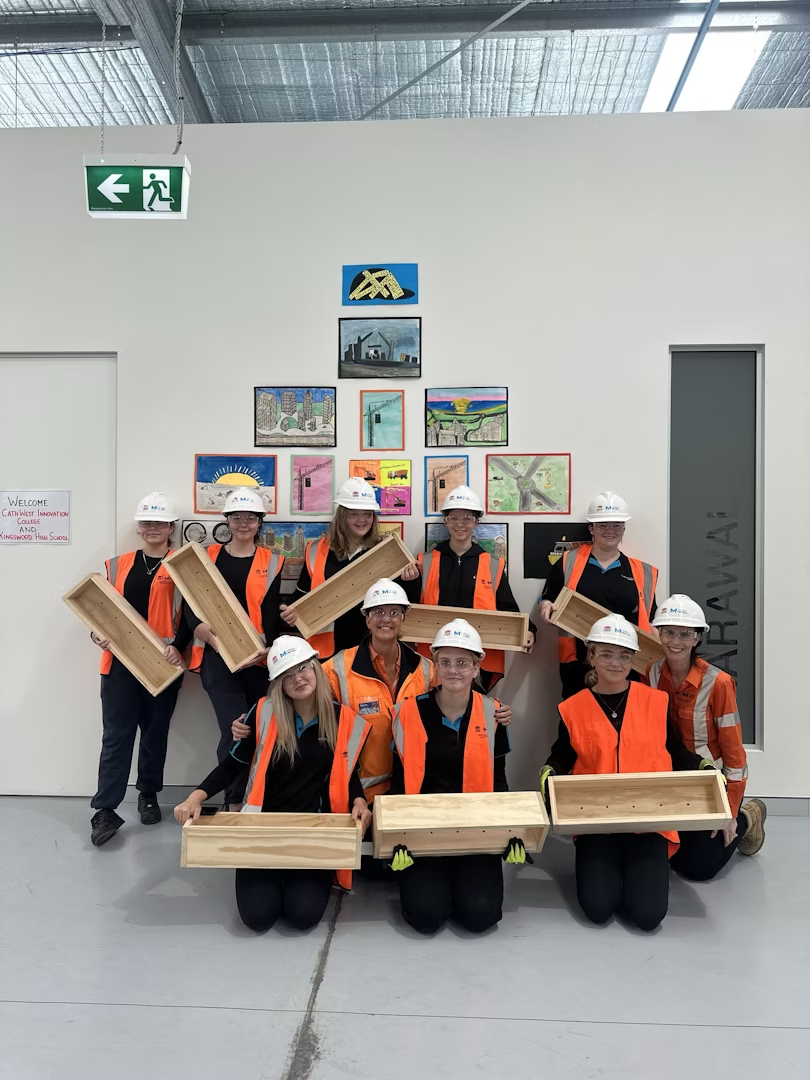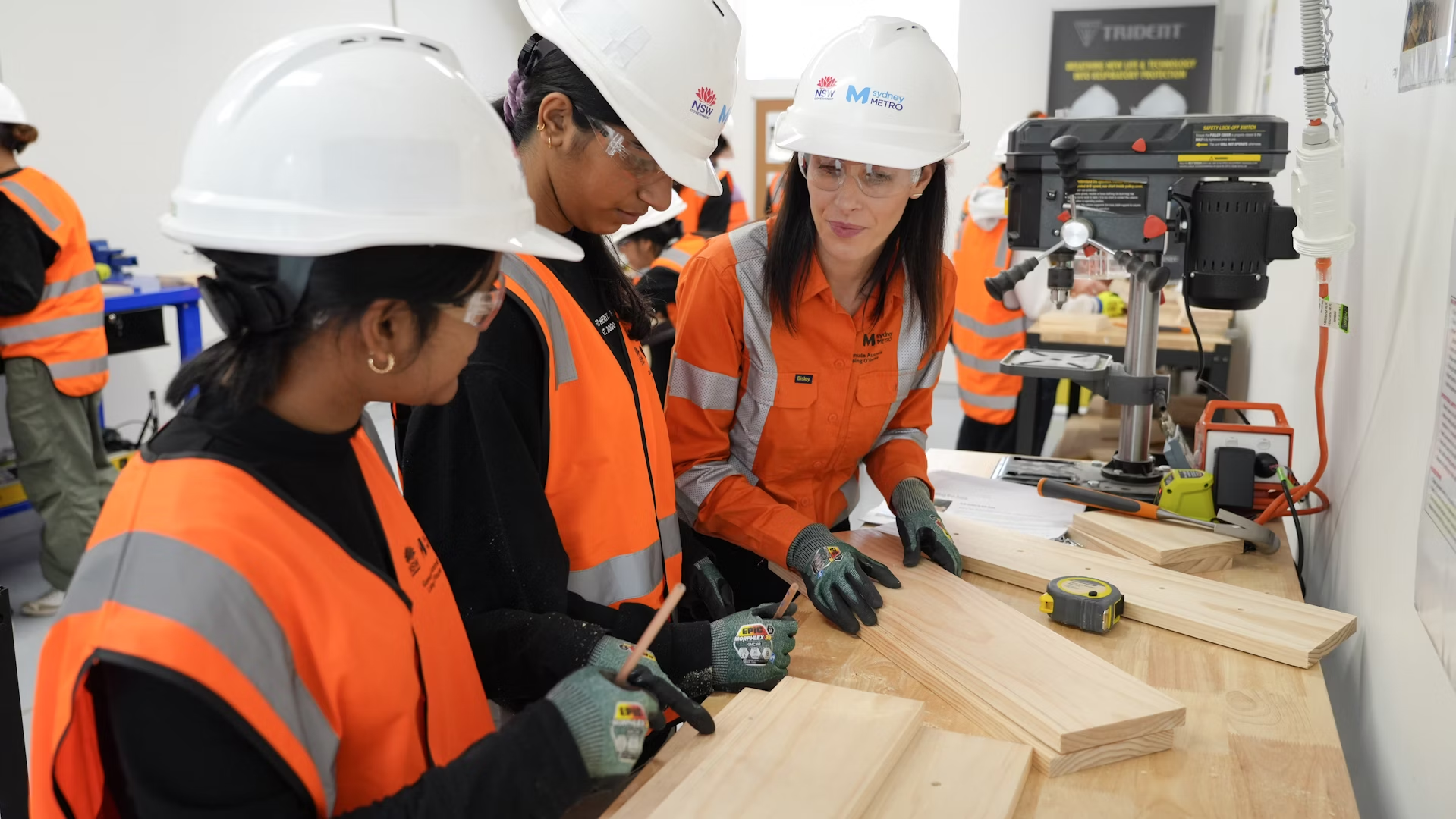Case Study: Sydney Metro West – Western Tunnelling Package
[embed]https://youtu.be/_CFNLHVQDe4[/embed]
Through collaboration across multi-functional teams and key stakeholders, including our client, Sydney Metro, Gamuda and Laing O’Rourke Consortium (GLC) has successfully delivered a first of its kind in NSW: the Tunnelling and Infrastructure Academy (TIA).
The TIA addresses an important issue in our industry: a skills shortage within construction and engineering to deliver a national pipeline of infrastructure work. With a shortage of people entering the industry and a need to attract a more diverse workforce, GLC designed the TIA to upskill our existing workforce while training the next generation of tunnelling workers to deliver the Sydney Metro West – Western Tunnelling Package (WTP).
Key stakeholders including WTP subcontractors, partners, schools, universities, government, and Registered Training Organisations (RTOs), were consulted to gain an understanding of the need for the facility, its benefits, and how we could collaborate to create opportunities for the existing and future WTP workforce.
The TIA is a purpose-built state-of-the-art training facility in Clyde featuring bespoke technical equipment which simulates the live environment of a tunnelling site, in a completely safe environment. Inside are six practical rooms featuring a decommissioned and refurbished Tunnel Boring Machine (TBM) cabin, TBM conveyor belt, partial cutterhead, grouting station and foaming station. The TIA also uses innovative technology, including three Virtual Reality (VR) modules developed specifically by TBM manufacturer Herrenknecht for TBM crane, TBM Erector and Emergency rescue modules. These practical and engaging components have been integrated into classroom-style training, and provide each learner with an immersive, holistic real-world training experience.
GLC was the lead contractor for the development of a first of its kind Unit of Competency in TBM tunnelling operations (RIICTC306 Conduct TBM Operations), which aligns directly with the Australian Qualification Framework. The TIA enabled Gamuda’s subject matter experts to partner with Health and Safety Advisory Service to develop bespoke training and assessment resources to deliver this training on WTP. The TIA’s in-house training technology significantly enhances learning experiences for WTP’s workforce, providing them with skills that would not have been able to be gained otherwise.
Establishing this unique facility represented a significant investment and undertaking to secure buy-in, funding and support. The execution and delivery of the TIA involved consultation and communication across various stakeholder groups, including Sydney Metro, industry and the wider community who would contribute to its success.
To secure the multi-million-dollar funding for the TIA and convince the business to invest in the facility, Gamuda Australia developed a value proposition modelled on the success of Gamuda’s Tunnelling Training Academy in Malaysia.
The team worked closely with building partners and the WTP site to build the TIA, also working closely with colleagues from Gamuda Malaysia to source and acquire the decommissioned TBM components used for the accredited training module.
To further support GLC’s commitment to sustainability, the TIA is powered entirely by an Australian-first 240kWp mobile solar farm, located on the WTP Clyde site and is one of the largest solar farms to be used on a Sydney Metro project to date.
Outcomes:
As a first-of-its-kind facility in NSW, the TIA enables the delivery of innovative virtual and hands on training programs targeted at attracting new entrants to the industry, and training and upskilling WTP’s new and existing workforce in a safe and simulated environment.
Located within the rapidly growing Parramatta LGA, the TIA additionally provides a unique opportunity for young people through pre-employment pathways (PEP), and school-based programs. Outcomes include:
• A first of its kind Unit of Competency in TBM tunnelling operations (RIICTC306 Conduct TBM operations), and other accredited training in civil and WHS, including bespoke upskilling opportunities for the existing WTP workforce.
• PEPs targeted at providing entry-level employment for new entrants and underrepresented groups such as women and Indigenous people.
• School-based programs targeted at youth and female students who may otherwise not consider a career in construction.
• Traineeships and Apprenticeships supporting continued learning for WTP’s existing workforce and new entrants.
The outcomes of these programs have been shared with WTP delivery partners, including subcontractors, RTOs, and the local community, including schools. Outcomes the above programs have achieved include:
Gamuda Girls Infrastructure Boost – Skills for Schools: In partnership with the NSW Department of Education and Training, this two-day program was designed and curated by Gamuda’s Training and Development Team to provide young female students in Greater Western Sydney from years 9-12 with an introduction to a career within the construction industry.
The program provides an opportunity to explore university, traineeship and apprenticeship pathways, get practical exposure to hand and power tools, and for the students to obtain a national unit of competency in CPR. Since launching, 16 schools from the Greater Western Sydney region have participated in the program, including schools who have never had access to these types of programs within their catchment area.
64 female students have participated in the Gamuda Girls Infrastructure Boost - Skills for Schools program, with 70% indicating an interest in pursuing a career in the industry. Broader outcomes of this program for WTP include expressions of interest for work experience, and the 2025 intake for the School-Based Apprenticeship and Traineeship program.
PEPs: In collaboration with Sydney Metro, Workforce Australia and registered training providers, our PEPs have targeted underrepresented groups.
The Sydney Metro First Nations PEP and Women Who Work in Tunnelling (WWWIT) PEP have been designed to give First Nations people and women an opportunity to pave a sustainable long-term career in the construction industry, helping to increase the participation of women in non-traditional roles.
Each PEP includes two weeks of accredited training, providing foundational skills for a variety of entry-level tunnelling roles and a formal six week mentoring and coaching program post-delivery. All participants were paid by Gamuda during the WWWIT PEP program, which was further supported by funding from the Department of Education and Training.
Since opening, the TIA has facilitated three PEPs. The three PEPs encompass 38 participants, including 42% female participation and 39% Aboriginal participation. The WWWIT PEP has achieved 100% employment outcomes for 15 women, with 13 employed directly by Gamuda or a project partner on WTP. 15 First Nations people who participated in the Sydney Metro First Nations PEP also all received employment outcomes.
The development of the TBM training resources has not only provided a unique upskilling opportunity for WTP’s internal workforce, but the content has also been established for industry utilisation, helping to address the skills shortage in this specialised area.
Traineeships and Apprenticeships: WTP has embarked on an impressive traineeship and apprenticeship journey, supporting continued learning for our existing workforce and new entrants. 123 traineeships and apprenticeships have been facilitated at the TIA, maximising utilisation of the practical equipment, for training that is conducted in a safe environment, and providing real-world experience.
Beneficiaries
Since opening in July 2023, the TIA and its curriculum has benefitted the construction industry, local community and new entrants by bolstering the accessibility and exposure to training and job opportunities. This positively impacts the NSW and Commonwealth Governments by providing increased confidence in the local workforce capability and confidence in the ability of contractors to deliver the infrastructure pipeline.
The TIA has become the hub where WTP have trained and upskilled our existing workforce on the project, including GLC employees – both staff (white collar) and workforce (blue collar), and subcontractors within the supply chain, creating a multiplier effect for the industry.
Through the TIA, locals and new-entrants can access jobs on the project through PEPs and school-based programs such as apprenticeships and traineeships. Local schools and VET programs have already enjoyed the benefits of the TIA.
These programs provide an opportunity, especially to young people, underrepresented groups and the local community, to understand the career pathways they wish to pursue, whilst also offering gender equity programs that encourage women to join the industry for meaningful career progression.
Industry partners have also benefitted through participation in the programs, including social enterprises such as Empowered Women in Trades, industry bodies such Engineers Australia, government and training organisations, such as Department of Education and Training, who also utilise the TIA to help attract and expose the future workforce to the construction industry.
As at September 2024, the TIA has facilitated 5,653 enrolments across 423 individual training events including:
• 12 school-engagement sessions
• 3 PEPs (First Nations, Heavy Haulage, WWWIT), resulting in 38 employment outcomes
o Female = 16
o Indigenous = 15
o Youth (under 25) = 4
o Refugee / Asylum Seeker = 1
o Returned Serviceperson = 3
• 129 tunnel training sessions to upskill our new entrants and existing workforce
• Traineeships and Apprenticeships:
o Certificate III in Civil Construction (Plant Operations) = 99
o Certificate IV in Leadership & Management = 11
o Certificate IV in WHS = 6
o Certificate IV in Civil Supervision = 3
o Diploma of Project Management = 4
Leaving a legacy
The TIA has addressed an important issue in our industry, a national skills shortage within construction and engineering and lack of industry capability to deliver a national pipeline of infrastructure work.
The delivery of critical training initiatives, made possible through the TIA, will have a multiplier effect on the workforce and wider construction industry as they take these skills into future roles. For instance, the newly developed RIICTC306 Conduct TBM Operations training materials have been provided to the industry for use, further cementing the legacy Gamuda are leaving and an example of the blueprint to successfully develop and replicate this training and accreditation across industries.
The TIA provides a new way of thinking about learning outcomes and has proven a valuable way to attract new entrants and under-represented groups to the industry. The legacy the TIA leaves behind is a proven concept to deliver education and training outcomes which can now be applied to the industry as a whole and replicated into new industries. The outcomes achieved via the training programs will have a broader impact on the industry. Already, we have welcomed other major construction firms through the TIA who aim to mirror its success.
With focus turning to the energy sector to achieve 82% renewable share of electricity by 2030, considerations for the next phase of the TIA include a transmission tower base to further upskill our existing workforce to deliver Australia’s renewable energy pipeline.
Through the TIA, the below UN SDG contributions have been achieved:
UN SDG 4: Quality education – ensure inclusive and equitable quality education and promote lifelong learning opportunities for all.
Driven by Sydney Metro’s identification for the need for inclusive and equitable education to contribute to a diverse and sustainable workforce, Gamuda has created an inclusive space for high quality education opportunities that has been traditionally out of reach for women and people from disadvantaged backgrounds.
Working together with our training partners (NSW Department of Education & Training, Health & Safety Advisory Service, Empowered Women in Trades) we created fit-for-purpose programs such as the Gamuda Girls Infrastructure Boost, to create pathways for women into traditionally male-dominated roles. Female students from Greater Western Sydney high schools have been able to experience life on-site, learn new skills, and connect with accomplished women in the engineering and construction industry. Seventy percent of these girls have already reiterated their interest in pursuing this career, showcasing the TIA’s contribution to quality education.
UN SDG 8: Decent work and economic growth - Promote sustained, inclusive and sustainable economic growth, full and productive employment and decent work for all.
The TIA has fostered productive and equitable employment opportunities for its participants, including youth and vulnerable populations. By providing high-quality training and skills development, the TIA equips individuals with the competencies required for successful careers in the construction industry. This, in turn, promotes inclusive and equitable employment practices. The TIA’s focus on executing Sydney Metro’s PEPs, apprenticeships and traineeships has created pathways for young people and those facing barriers to employment to enter the workforce, “equal pay for work of equal value”.
The PEPs have also provided employment outcomes for women and First Nations people who have been employed directly by Gamuda or a project partner on WTP. These initiatives collectively drive Sydney Metro’s vision of a more just and equitable labour market. The program aimed to provide women and First Nations people an opportunity to pave a sustainable, long-term career in the construction industry, complete with mentoring following the program to further enhance their success.


